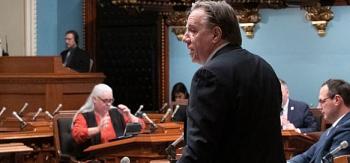Quebec leaders forced to face systemic racism in 2020
It was a former CFL player and community activist who helped push the concept of systemic racism to the forefront in Quebec politics this year, after forcing the city of Montreal to confront the issue.
Balarama Holness used a provision in the city’s charter to trigger a public consultation that would include 7,000 participants and produce 38 recommendations, including that Montreal recognize the systemic nature of racism and discrimination against racialized groups.
Holness’s petition — signed by more than 22,000 people — was launched in 2018, but the results were released last June, shortly after the police-involved killing of George Floyd in Minnesota, which sparked anti-racism protests in the United States, Canada and around the world.
“The actions taken in Quebec and Montreal right now on issues of racism are directly derived from the public consultation that was forced on the city,” Holness said during a recent interview.
And while Montreal’s mayor has said she recognized systemic racism existed and has vowed changes, the Quebec government has refused to accept the term. Instead, Premier François Legault created an anti-racism task force the same day in June the report in Montreal came out.
Holness said he believes the reticence toward using the term “systemic racism” comes from a fear among the majority of white Quebecers of seeing an erosion of their rights. “Their miscomprehension of the term also fuels this level of ignorance whereby systemic racism means all Quebecers are racist, which is simply not the case,” Holness said.
The current debate over the term in Quebec is years in the making. Three years ago, the Liberals tried to hold a public consultation on systemic racism but cancelled the event after outcry from the public and the opposition. The government at the time said the consultation would amount to putting Quebecers on trial — an argument Legault has often repeated.
Quebec’s unwillingness to address the systemic nature of racism — those biases, policies and practices entrenched in institutions — makes it difficult to address the issues, according to Dr. Myrna Lashley, assistant professor in McGill’s psychiatry department.
“How do you fix the hole in your roof if you don’t acknowledge there’s a hole in your roof?” she said in a recent interview.















